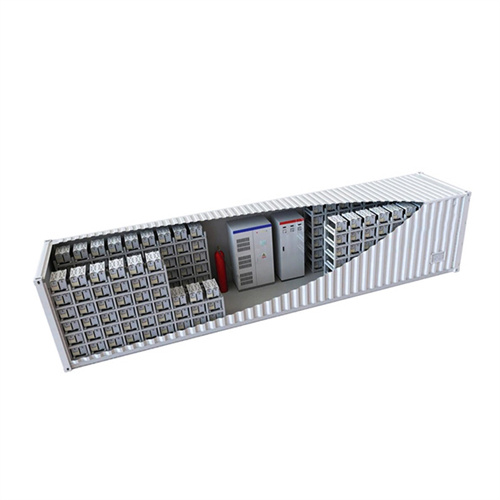Transportation of large lithium battery energy storage devices

Applications of Lithium-Ion Batteries in Grid-Scale Energy Storage
In the electrical energy transformation process, the grid-level energy storage system plays an essential role in balancing power generation and utilization. Batteries have

Research summary – Marine transport of energy storage systems
An energy storage system is defined as an energy storage device consisting of an outer casing containing a large-format power cell (e.g., battery) as well as the necessary ancillary

Lithium Batteries: A guide to safe transportation, storage and
Lithium batteries are a common feature in our modern world, powering everything from mobile phones to vehicles. Given the potential safety and environmental risks posed by batteries,

Recent developments and applications of energy storage devices
This study presents the recent application of energy storage devices in electrified railways, especially batteries, flywheels, electric double layer capacitors and hybrid energy

Battery Technologies for Grid-Level Large-Scale
This work discussed several types of battery energy storage technologies (lead–acid batteries, Ni–Cd batteries, Ni–MH batteries, Na–S batteries, Li-ion batteries, flow batteries) in detail for the application of GLEES

The Great History of Lithium-Ion Batteries and an Overview on Energy
In contrast from other energy storage devices, lithium ion rechargeable batteries gained much attention owing to its distinctively superior electrochemical energy density and

Battery Technologies for Grid-Level Large-Scale Electrical Energy Storage
Grid-level large-scale electrical energy storage (GLEES) is an essential approach for balancing the supply–demand of electricity generation, distribution, and usage. Compared

Ionic liquids in green energy storage devices: lithium-ion batteries
Due to characteristic properties of ionic liquids such as non-volatility, high thermal stability, negligible vapor pressure, and high ionic conductivity, ionic liquids-based electrolytes

Electrical energy storage for
Today''s lithium-ion batteries, although suitable for small-scale devices, do not yet have sufficient energy or life for use in vehicles that would match the performance of internal combustion vehicles. Energy densities 2 and 5 times greater are

Energy Storage Systems: Technologies and High
Energy storage systems are essential in modern energy infrastructure, addressing efficiency, power quality, and reliability challenges in DC/AC power systems. Recognized for their indispensable role in ensuring

Fire Accident Risk Analysis of Lithium Battery Energy
Maritime transportation has the advantages of large volume, low cost, and less energy consumption. Therefore, it is the main transportation mode for the import and export of LBESS. A lithium-ion battery energy storage

Review of energy storage and transportation of
Energy storage and transportation are essential keys to make sure the continuity of energy to the customer. Electric power generation is changing dramatically across the world due to the environmental effects of

6 FAQs about [Transportation of large lithium battery energy storage devices]
Why are lithium-ion batteries important?
They also constitute a major incentive to harness alternative sources of energy and means of vehicle propulsion. Today's lithium-ion batteries, although suitable for small-scale devices, do not yet have sufficient energy or life for use in vehicles that would match the performance of internal combustion vehicles.
Are lithium-ion batteries a good choice for EVs and energy storage?
Lithium-ion (Li-ion) batteries are considered the prime candidate for both EVs and energy storage technologies , but the limitations in term of cost, performance and the constrained lithium supply have also attracted wide attention , .
How to improve the production technology of lithium ion batteries?
However, there are still key obstacles that must be overcome in order to further improve the production technology of LIBs, such as reducing production energy consumption and the cost of raw materials, improving energy density, and increasing the lifespan of batteries .
Are Li-ion batteries the future of energy storage?
From the most utilized electrochemical sources (Table 2), Li-ion batteries gain interest in storage installations, accounted for more than 85% of new energy storage distributions in 2016.
What are lithium-ion batteries?
Provided by the Springer Nature SharedIt content-sharing initiative Lithium-ion batteries (LIBs) have attracted significant attention due to their considerable capacity for delivering effective energy storage. As LIBs are t
Can flow batteries be used in grid energy storage applications?
However, these systems are still in the developmental stage and currently suffer from poor cycle life, preventing their use in grid energy storage applications. Flow batteries store energy in electrolyte solutions which contain two redox couples pumped through the battery cell stack.
Related Contents
- Large lithium battery energy storage equipment
- Energy storage large capacity lithium iron phosphate battery
- Lithium Battery Energy Storage System Co Ltd
- Grid connection principle of lithium battery energy storage system
- Lithium battery energy storage customized source manufacturer
- Home energy storage lithium battery manufacturer contact
- Communication base station lithium battery energy storage cabinet
- Energy Storage Lithium Battery Tutorial Diagram
- Which type of energy storage lithium battery is better
- How to detect the capacity of energy storage lithium battery
- Multi-technology lithium battery energy storage station
- Schematic diagram of lithium battery energy storage control board